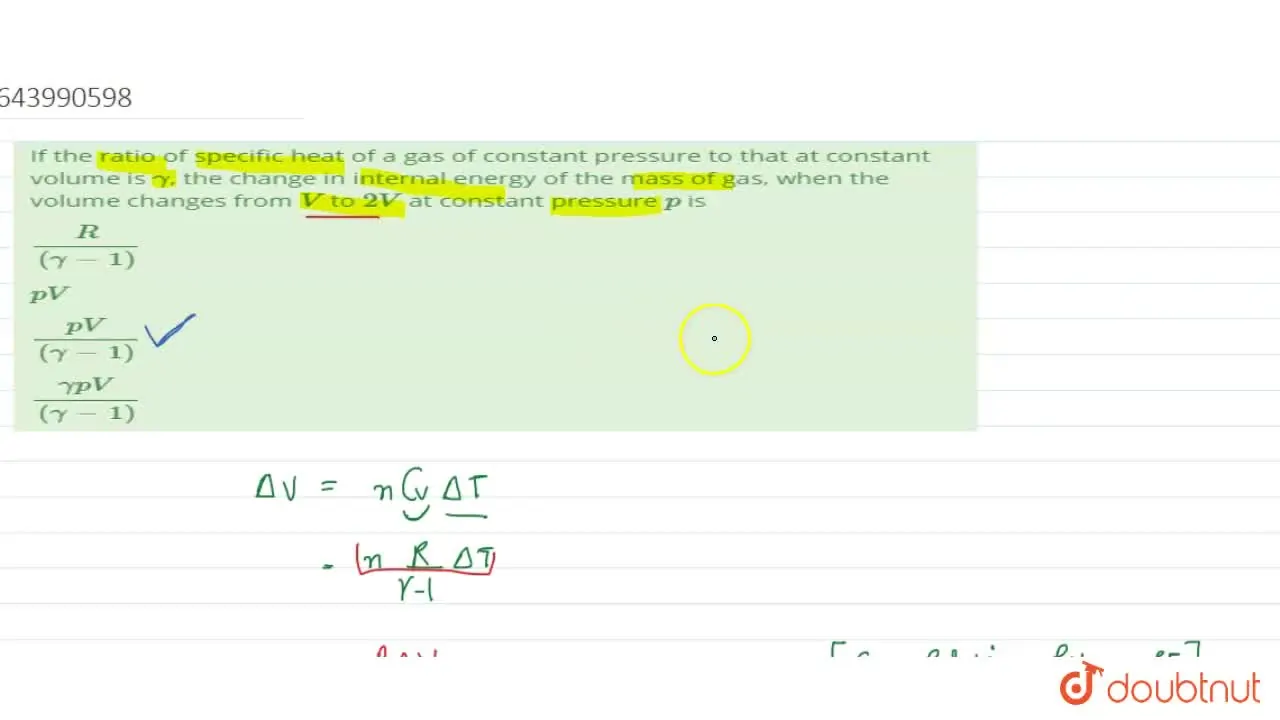If the ratio of specific heat of a gas at constant pressure to that at constant volume is γ, the change in internal energy of a mass of gas when the volume changes from V to 2V at constant pressure p is
R/(γ−1)
pV
pV/(γ−1)
γpV/(γ−1)
The correct Answer is:C
c. ΔU=nCvΔT
Also, CPCv=γ
Hence CP−CVCv=γ
⇒CV=R/(γ−1)
ΔU=nRγ−1ΔT=pΔVγ−1=p(2V−V)γ−1=pVγ−1
Related Playlists
- BOOK - CENGAGE PHYSICS ENGLISHCHAPTER - KINETIC THEORY OF GASES AND FIRST LAW OF THERMODYNAMICSEXERCISE - Multiple Corrects29videos
KINETIC THEORY OF GASES AND FIRST LAW OF THERMODYNAMICS
- BOOK - CENGAGE PHYSICS ENGLISHCHAPTER - KINETIC THEORY OF GASES AND FIRST LAW OF THERMODYNAMICSEXERCISE - Assertion-Reasoning6videos
KINETIC THEORY OF GASES AND FIRST LAW OF THERMODYNAMICS
- BOOK - CENGAGE PHYSICS ENGLISHCHAPTER - KINETIC THEORY OF GASES AND FIRST LAW OF THERMODYNAMICSEXERCISE - Subjective22videos
KINETIC THEORY OF GASES AND FIRST LAW OF THERMODYNAMICS
- BOOK - CENGAGE PHYSICS ENGLISHCHAPTER - KINETIC THEORY OF GASESEXERCISE - Compression2videos
KINETIC THEORY OF GASES
- BOOK - CENGAGE PHYSICS ENGLISHCHAPTER - LINEAR AND ANGULAR SIMPLE HARMONIC MOTIONEXERCISE - Single correct anwer type14videos
LINEAR AND ANGULAR SIMPLE HARMONIC MOTION
Similar Questions
If the ratio of specific heat of a gas of constant pressure to that at constant volume is γ, the change in internal energy of the mass of gas, when the volume changes from V to 2V at constant pressure p is
View SolutionThe ratio of the molar heat capacities of a diatomic gas at constant pressure to that at constant volume is
View SolutionThe ratio of the specific heat at constant pressure to that at constant volume is larger for a diatomic gas than for a monoatomic gas.
View SolutionFor a gas if ratio of specific heats at constant pressure and volume is g then value of degrees of freedom is
View SolutionFor an ideal gas, the heat of reaction at constant pressure and constant volume are related as
View SolutionDefine molar specific heat capacities of a gas at constant pressure and constant volume. Why are they called 'principal specific heat capacities?
View SolutionIf CPandCV denote the specific heats of nitrogen per unit mass at constant pressure and constant volume respectively, then
View SolutionA diatomic gas is heated at constant pressure. If 105J of heat is given to the gas, find (a) the change in internal energy of the gas (b) the work done by the gas.
View SolutionCp is always greater than Cv for a gas, which of the following statements provide, partly or wholly, the reason for this?
(i) No work is done by a gas at constant volume
(ii) When a gas absorbs heat at constant pressure, its volume must change
(iii) For the same change in temperature, the internal energy of a gas changes by a smaller amount at constant volume that at constant pressure
(iv) The internal energy of an ideal gas is a function only of its temperatureView SolutionAssetion : Specific heat of a gas at constant pressure is greater than its specific heat at constant volume.
This is because at constant pressure, some heat is spent in expansion of the gas.View Solution


